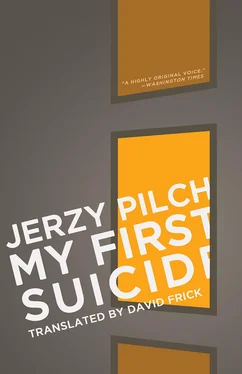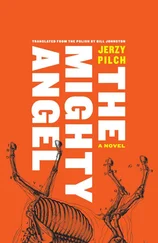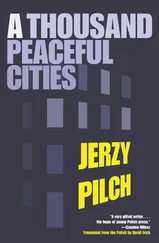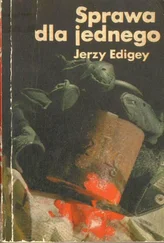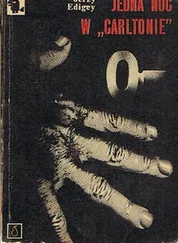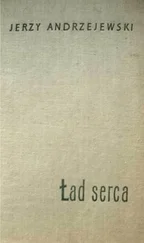As if for fear that I might disturb some sort of integrity, I didn’t cut the picture out; instead, I kept the entire newspaper. I put it into the drawer in which I keep the shot for my air rifle, and from time to time — decidedly too often — I would take it out and stare at it with fascination, and I would study it through a magnifying glass, and I looked at it under the light, and I probed the texture with my fingers, and I considered entirely seriously how to get to the laboratories where they could take an X-ray of it, magnify it to unparalleled graininess, out of which a secret sign would loom and establish the crucial, all-revealing DNA of the paper on which it was printed.
At all costs, and in vain, I attempted to decode the sudden and obsessive presence of Tolstoy’s chessboard in my brain.
You all know such situations: an inconceivably distinct detail of a distant landscape; a strange light, nobody knows from where; a house, seen from the window of a train, toward which someone is running along a sandy path; the shadow of the suddenly turned head of a passer-by; the arrangement of objects on a table — someone, something, nobody knows what, suddenly comes to mind and gives you no peace.
The photograph of Tolstoy playing chess gave me no peace for three years. To this day, I don’t have total peace, perhaps even quite the contrary, but at least I have been able to formulate certain suppositions. If I were the narrator of a detective novel, I would say that I have established the direction of the investigation.
I suppose it would not be beside the point to emphasize that I am not an especially ardent fan — either of chess or of Tolstoy. There is nothing frivolous in this confession. Especially as far as Tolstoy is concerned. I admire the author of War and Peace . I admire him inordinately and devoutly. Perhaps even, if someone were to force me to name the greatest novelist in history — a little bit shooting in the dark, but with inexorable intuition — I would name him. After all, if a novel is supposed to create a world — or even a universe — he was the most fully successful at it. I say that I am not an ardent fan, only because I don’t know him well. You can’t be an ardent fan of something you don’t know inside and out. Fanaticism presupposes cognitive perfection. And I know well, I even know very well, only one of his texts. Most certainly, I can confess with a pure conscience that I am an ardent fan of that one text. I’m an ardent fan of “The Death of Ivan Ilych.” I consider this story the masterpiece of all masterpieces, the limit of human possibilities in the art of narration. All Tolstoy’s other things I esteem and admire. I esteem and admire, but — please understand me well — I don’t catch their scent.
Truly great, truly near, and truly intense writers have a scent. Nabokov smells of sea salt, Erofeev of honeysuckle, Márquez of saltpeter, Zweig of a November sky. Iwaszkiewicz of pine needles. Broch of glacial waters flowing down into a valley, Platonov of a burning-hot smithy.
Tolstoy doesn’t have a smell. Unless prose has the smell of dying, and death is like air.
A few years ago I bought a fourteen-volume edition of his works in a used book store; of course, I didn’t read everything, but I read War and Peace once, Anna Karenina and Resurrection twice, “Kreutzer Sonata” three, or perhaps even four times. I return to “Ilych” frequently, and always, as I read the last sentence — about “the death that is finished”—I get goosebumps. But I never had any sort of “Tolstoy phase,” some sort of Tolstoyan preoccupation or obsession. And it is not a matter of common platitudes: that the adoration of a great genius whose works have been published in the form of “Collected Works” is always marked by a certain coolness; that, granted, one admires Shakespeare, Goethe, or Dante, but that one doesn’t go mad over them; and even — to tell the truth — that one rarely reads them before going to sleep . Such bullshit doesn’t apply to me. I read the classics before going to sleep. Or rather at dawn, for in the evening, whatever I pick up, whatever classic, whatever Flaubert, whatever Dickens, before I get to the end of the first page — I fall asleep. But I awake at dawn, and then I read the classics. With admiration and without any madness. Apparently, once a person is of an age when he reads only at dawn, and only classics, it is too late for great obsessions. Even the obsession — and it was an obsession — with the picture in the newspaper, in which Tolstoy plays chess, didn’t incline me to obsessive reading of his collected works.
The caption under the photograph declared that in his old age his favorite game was chess; but if this was the case, did he write even one sentence about chess? It seemed, more or less, that, in the cosmos created by him, there ought also to be a place for chess, but where should one look for it? It seems to me that neither in Karenina , nor in Resurrection , and absolutely not in “The Death of Ivan Ilych,” is there a single word about chess. Granted, the idea of thoroughly studying his remaining works — from the point of view of the presence of chess motifs — occurred to me, but nothing more. That intriguing idea did not become deed in the least. Of course, when you can’t establish something, you have to invent it. That’s what experiencing the world through literature is about. The foolishly beautiful idea that I myself might compose a mysterious story about the unknown chess episode in the life of Tolstoy was, however, entirely beyond my reach.
I didn’t have even a preliminary intuition whether the magnetism that drew me to this picture was hidden in the writer himself, who was bent over the chessboard, or in his opponent, who was dressed in the fashion of the landed gentry (and whose face, incidentally, seemed to me strangely familiar), or in the members of the household, gathered in great numbers around them, who were seemingly cheering on one or the other, but who were actually posing for the photograph. (Although Sophia Tolstoy seems to have been genuinely cheering — in any case, she is looking intently at the black figures with which her husband is playing.)
Finally, I made the effort, and with the help of a certain petite, but inordinately enterprising Russianist, vintage 1968, I established who is who on the daguerreotype. Incidentally, the petite, but inordinately enterprising Russianist, vintage 1968, who, at first, thought I had come up with a subtle pretext for you-know-what, then, that I was a maniacal nutcase, finally herself became excited about the topic and assembled an extensive group of materials proving that, after all, chess played no trivial role in Tolstoy’s life. She even obtained a special book from Moscow, published in the sixties, entitled Tolstoy i shakhmaty [ Tolstoy and Chess ]. I looked everything over carefully, I made notes, but I knew from the beginning that these were only formal activities, which would by no means push anything forward. And indeed — they did not.
The secret was probably in chess itself. But — to repeat — I’m a mediocre chess player. Of course, it is possible to speak here of more intense emotions and greater proficiency. The fact, however, that I know more about chess than about the life and works of Lev Tolstoy does not mean that I know a lot about chess. Granted, I used to have a few strong opening moves. Now it is up and down. Now, even that ability, if it’s not fading, certainly doesn’t show any sparks; but I used to have a few strong opening moves. Perhaps even excellent. Nothing but grandmasters were my teachers. That’s right. Each was a grandmaster, and each had his own distinct and unforgettable style of play: Grandpa Pech — bawdy renaissance style; Grandma Pech — fierce style; Uncle Ableger — lightning fast style; Uncle Paweł—devout style. With the exception of Mother, all the members of the household played chess.
Читать дальше
